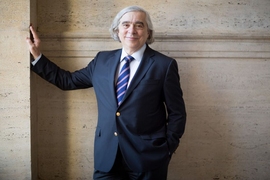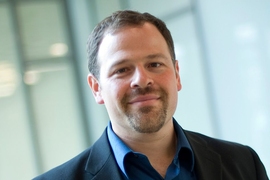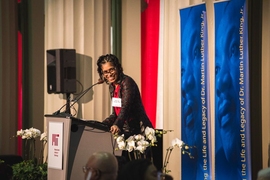Vermont senator Bernie Sanders made a forceful pitch for his progressive political vision in a talk at MIT on Friday evening, asserting that U.S. politics “must be” liberal in nature if the country is to surmount its economic and social struggles.
“In the country today, there is a lot of desperation and fear and anxiety about what is going on economically,” Sanders said, noting that the top one-tenth of 1 percent of Americans has as much financial wealth as the bottom 90 percent.
To counteract that, Sanders argued, the country should implement a series of progressive measures: a single-payer health care system, the removal of large money donations from politics, and a complete overhaul of the energy production system, among other things.
“The future of this country will be and must be based on a progressive vision,” Sanders contended.
Those policy ideas, to be sure, are measures Sanders himself backed vigorously during his surprisingly successful 2016 presidential campaign. Sanders’ candidacy, initially expected by many observers to be an electoral afterthought, gained traction with voters for months and helped reveal how deeply economic stress has affected the middle and working classes in American society.
Sanders’ remarks on Friday also had the feel of a campaign event at times. Sanders noted that he won 22 states in the Democratic Party primary and claimed 46 percent of the primary’s popular vote (although calculations vary).
And with the tenor of national politics resembling that of a campaign these days, Sanders claimed victory in the recent political battles over health care, saying public resistance had caused the Republican party’s decision in March to stop pursuing a health care bill.
“As a result of all that grassroots activism, we defeated the Trump-Ryan health care agenda,” Sanders asserted.
Sanders spoke to a capacity crowd of about 1,500 at MIT’s Kresge Auditorium, which gave him a standing ovation at the outset of his remarks.
The senator was speaking, in part, to back his recent book, “Our Revolution,” which contains both an autobiographical account of his career and reflections on the nation’s current political situation.
Sanders’ speech was co-sponsored by the Harvard Bookstore, an independent bookseller in Cambridge, Massachusetts; the Boston Review, which is published at MIT; and the MIT Department of Political Science.
In his talk, Sanders recalled how he ran a series of unsuccessful campaigns for office in the 1970s before getting elected mayor of Burlington, Vermont, in 1981, by just 14 votes after the ballots were first counted — and by just 10 votes after a recount. Sanders served for eight years as Burlington mayor, became Vermont’s congressman in 1990, and was elected to the U.S. Senate in 2006.
Sanders’ presidential campaign has come very late in his career. Before he ran, Sanders told the audience, he had one concern above all else: that if he fared poorly, his showing would be interpreted to mean that progressive ideas were not popular.
“That was what worried me the most,” Sanders said.
Instead, he beat expectations easily and his performance became a bellweather indicating the extent of public discontent with the economic structures of contemporary society.
President Donald Trump, as it happens, also offered voters a kind of populism on the campaign trail in 2016. But a running theme in Sanders’ remarks was the need for progressives to fight for favor with working-class voters and lay claim to the mantle of populism. Trump’s presidency, Sanders added, has given progressives a new opportunity to do this.
“What he promised working people throughout this country was not what he intended to deliver,” Sanders said.
On a day in the Boston area featuring rain, sleet, snow, and occasional combinations of all three at once, Sanders jokingly told the audience he wanted to “thank all of you on this beautiful spring day for coming out,” and suggested he might have to head north to Vermont to find better weather.
But Sanders’ outlook was not, overall, as gloomy as the weather.
“There is a lot of beauty in this country, a lot of extraordinary people who want this country to be what it can be,” Sanders said.
And, asked in a concluding question-and-answer session what advice he had for progressives who wanted to have a political impact at a time when Republicans have increased their control of the government, Sanders answered: “I can’t tell any one person what to do. But I will say this: Despair is not an option.”











